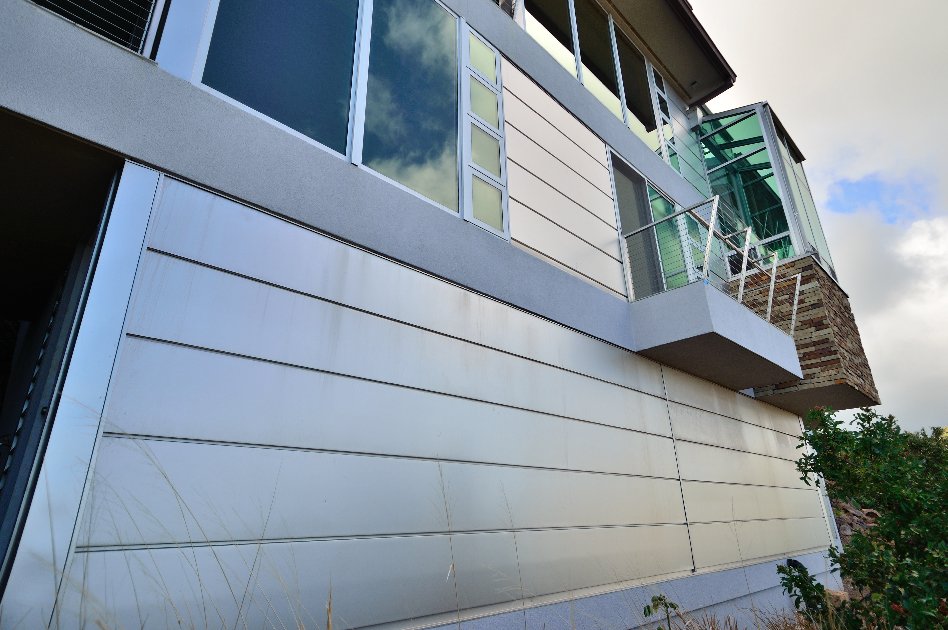We all make choices; sometimes those choices can have an extraordinary impact on the results. Denny Sadowski chose to build his home sustainably. His goal was to build the most maintenance free home possible while achieving a sophisticated look that would last indefinitely. The house, located on a valley wall about 1000 feet above Honolulu, regularly sees horizontal rain, heavy winds and volcanic haze from the area’s active volcano, all of which contribute to the degradation of conventional materials. Further, the marine environment, in combination with these site location factors create a substantial challenge in selecting materials that will last.
The house is built on a 60% grade lot which offers a 180 degree view of the ocean and mountains. The spectacular views bring many challenges when it comes to building. The foundation was designed with micro-piles which are drilled into bedrock and then filled with concrete. This means the house rests on bedrock even though it may be 15’ – 20’ under the top of the soil. This type of foundation is virtually earthquake proof as the individual micro-piles are independent of one another and therefore the rigidity of a typical foundation of slip footings and walls does not exist. The house’s foundation will be able to move and flex with earthquake movements. The engineer called for 13 micro-piles to make up the foundation. But true to Sadowski’s sustainable, maintenance free point of view, they installed 23 micro-piles to ensure the house would always remain firmly situated on the mountain.
Architect James Mayo Macari of Santa Barbara, CA designed the home. He recommended metal and spent time researching how different metals perform under severe marine conditions. He considered zinc and determined that stainless steel was the best choice. A great deal of research and thought went into the decision. Stainless steel had not previously been used as siding panels for homes and thus required knowledge, skilled craftsmen and a system for connecting the siding together.
Sadowski and his wife Eileen chose the ATI 2003 duplex alloy version of InvariMatte® stainless steel from Contrarian Micro Textures for the siding of their home. “Very seldom do architects get the opportunity to feel the freedom of unrestricted design from vanguard materials and use. Denny and Eileen have given that opportunity and it is appreciated,” added Macari. Although the stainless wall panels are more expensive than those built with conventional metals, they are performing beautifully, showing no signs of degradation. The Sadowski’s can rest assured they made a wise investment.
The stainless steel panels were manufactured with a channel groove to link it together to create the siding. They chose Densglass panels to fill the space between the siding panels and the house frame which contributed to panel stability and insulation. Co-HA Builders, Honolulu, Denny Sadowski’s company, built the home.
Solar panels on the roof heat the potable water and the water for the hot tub which adds to the efficient design. In addition, there are photovoltaic panels of the roof as well that supply about 75% of home’s electricity, which translates to a purchase of less than 25% from the electric company.
The home’s copper roof adds a distinctive look, mixing the metals and adding to the sophisticated, clean lines of the home. The roof was installed by Rick King Contracting. Aluminum Shake Roofing Co. formed the InvariMatte® stainless steel into the sizes required for the flashings and accessories.
Sadowski continued with high quality on the interior, bringing hard rock maple in from Wisconsin for the vaulted ceilings, flooring, casing, base and the doors. Woodstock Milling of Birnamwood, Wisconsin provided stacks of Northern Hard Maple for the home’s interior. The ceiling roller drapes cover the rib skylights when desired and recede as well offering an extraordinary view. The ceiling truss is exposed adding to the architectural open feel.
The doors were made locally in Hawaii by Bellos Millwork. They built the doors from engineered wood and then veneered the cores with peeled maple taken from the 8/4 maple wood planks supplied by Woodstock. This was necessary to maintain the stability of the doors in the humid Hawaiian environment.
The house is on three levels with a wine cellar on the lower level designed to look like a cave with heavily textured walls. There are also three bedrooms, a laundry and a bathroom on that level. The shop and garage are on the upper level with the living level beneath it. The main living area is the middle level which has a solarium which houses a deck and hot tub. The kitchen, living room, dining area, entertainment room, powder room and master suite comprise that level with knockout views overlooking the valley and ocean. An elevator had been installed for ease of use, especially with older guests. The result is a handsome, efficient, sustainable home with stunning vistas in multiple directions.
